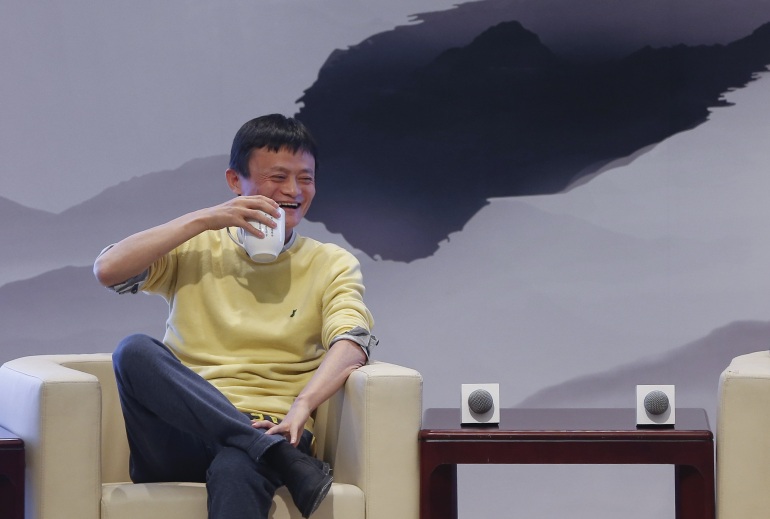Why Alibaba has Jeff Bezos looking over his shoulder

Jack Ma, chairman of Alibaba Group, attends the Internet Financial Industry Forum and ZhongAn Insurance Launch in Shanghai, China on November 6, 2013. (AP)
The listing of the Chinese e-commerce giant Alibaba is one the most anticipated events for global investors in 2014. The Hangzhou-based company announced over the weekend that it has started preparing for an IPO which would be the largest since Facebook in 2012.
Macquarie estimates Alibaba could be worth as much as $200 billion, which would make it the world’s second largest internet company behind the Sun King of Silicon Valley -- Google. Goldman Sachs believes the company could be valued at $150 billion.
Why is Alibaba’s listing so enticing to investors? The company is the largest e-commerce company in the world. It sold more goods than Amazon and eBay combined in 2012. The company provides services to more than six million merchants and 300 million retailer customers worldwide.
It has a five per cent share of China’s retail market, which is soon expected to become the largest in the world. The company is also tipped to become the world’s first e-commerce company to handle more than $1 trillion a year in transactions.
It is not only the size, but also the company’s profitability and its growth rate that set investors’ pulses racing. The company made $US 3.1 billion in operating profits -- which implies a 46 per cent margin -- in the 12 months to September, according to Yahoo, which is the second largest shareholder in the company.
During the April-June quarter last year, the company’s revenue increased 61 per cent and gross profits shot up 71 per cent. By comparison, Amazon’s annual profits were only about one fifth of Alibaba's.
If we look beyond numbers, we can see Alibaba as a whole ecosystem, which is the way the company’s founder Jack Ma likes to describe it. Ma is building an Alibaba empire that encompasses on-line retailing, payment systems, micro-finance and logistics.
He also has the ambition to build up a credit culture which is currently weak in the country and challenge Chinese banks through his on-line financial product Yuebao, which offers nearly twice the interest rates to one year bank deposit rates.
It all looks very promising, but what’s the catch?
Some of the investors, including two of Alibaba’s largest shareholders -- Yahoo and Japan’s Softbank -- which collectively own 61 per cent of the company, have good reasons to doubt Ma’s integrity.
Ma has had a tense relationship with his two largest foreign shareholders over the control of the company. Like other internet entrepreneurs, he likes to have control over the company he founded. In order to fend off eBay, Ma sold 35 per cent of Alibaba to Yahoo for $1 billion back in 2005.
He didn’t like the deal and tried unsuccessfully to buy back his shares. Ma’s dispute with Yahoo reached a crescendo in 2010, when he transferred the ownership of Alipay, a lucrative part of his empire, away from the group to a private company controlled by him and another founder of Alibaba without the knowledge and the consent of the board.
To be fair to Ma, China’s central bank dictates that only companies with majority Chinese control are eligible for the third party payment license that Alipay needs. However, Ma clearly breached the trust, and some would even say the contract, between himself and his foreign investors.
His actions not only take the shine off his semi-deity status in the eyes of many foreign investors but it’s also likely to cast a long shadow over the future of Alibaba and investor confidence in it in the future. There are suggestions Ma’s action sparked a round of shorting of China related stocks by American investors between 2010 and 2011 when doubts were strongest over their accounting standards.
Apart from dealing with famously litigious American investors, Alibaba is also making some powerful enemies at home -- including with the country’s powerful financial behemoths whose cosy business models of ripping off depositors has been threatened by Yuebao (Alibaba and the Chinese banking thieves 26 February).
So far the Chinese central bank has been supportive of Alibaba, but there are signs that Beijing is starting to get nervous about the company’s unbridled ability to introduce disruptive innovation into the financial system.
For example, China’s central bank has blocked plans by Alibaba and its fellow internet giant Tencent to offer virtual credit cards. It is a sign that Beijing wants to tighten restrictions on online financial products that Alibaba started back in June last year.
The rise of Alibaba is a testimony to entrepreneurship in China and what is possible once the meddling hands of government are shackled. The listing of Alibaba will see the Alligator of the Yangtze swimming with the crocodiles of the Amazon. Jeff Bezos would be wise to look over his shoulder a little more often now.
The Economist thinks “Alibaba has the potential to become the world’s most valuable company, and in the process help create a better China.” We can only hope that there are more people like Jack Ma who can transform China one deal at a time.
Follow Peter Cai on Twitter: @peteryuancai
Subscribe to the China Spectator newsletter: http://bit.ly/ChinaSpec
















